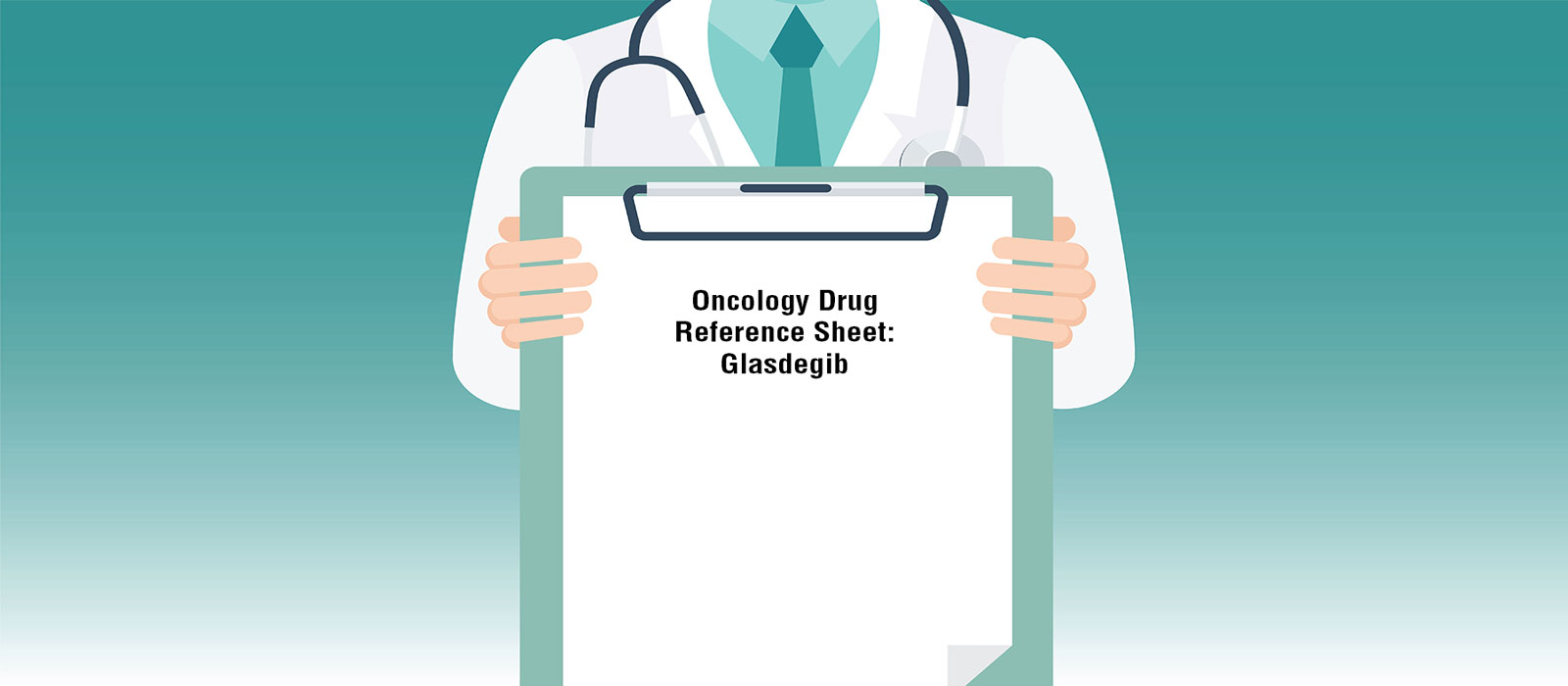In November 2018, the U.S. Food and Drug Administration (FDA) approved glasdegib (Daurismo™) for use in combination with low-dose cytarabine for treatment of patients with newly diagnosed acute myeloid leukemia who are not eligible for intensive chemotherapy. Data from clinical trials indicated that the regimen is safe for older adults and those with significant comorbidities, such as cardiac disease, poor performance status, or elevated serum creatinine.
Category/Class
Targeted therapy/hedgehog pathway inhibitor
Indication
The FDA approval is for use in combination with low-dose cytarabine for treatment of newly diagnosed acute myeloid leukemia in people who are at least 75 years old or who have comorbidities preventing use of intensive induction therapy.
Dosing
Administer 100 mg orally once daily in combination with cytarabine 20 mg subcutaneously twice daily on days 1–10 of each 28-day treatment cycle. Treatment should be continued for at least six cycles unless unacceptable toxicity or loss of disease control occurs. Glasdegib may need to be interrupted, dose reduced, or discontinued if patients experience QTc prolongation, cytopenias, or other grade 3 or 4 toxicities.
Administration
Instruct patients to take glasdegib orally, with or without food, at the same time each day.
Adverse Reactions
Clinically significant QTc prolongation and ventricular arrhythmias have occurred (5%), including ventricular fibrillation and ventricular tachycardia. Other common adverse reactions are anemia (41%), fatigue (36%), febrile neutropenia (31%), thrombocytopenia (30%), muscle pain or spasm (30%), edema (30%), nausea (29%), dyspnea (23%), decreased appetite (21%), mucositis (21%), rash (20%), constipation (20%), pneumonia (19%), renal insufficiency (19%), atrial arrhythmia (13%), and bleeding/hemorrhage (6%). Electrolyte imbalances, such as increased creatinine (96%), hyponatremia (54%), hypomagnesemia (33%), increased AST (28%), increased bilirubin (25%), and increased alkaline phosphatase (23%), also can occur.
Nursing Considerations
- Women who are pregnant or breastfeeding should not be given glasdegib. Female patients of childbearing potential must have pregnancy testing completed before beginning treatment.
- Patient history should include evaluation for pre-existing cardiac disease or electrolyte imbalances.
- An electrocardiogram should be obtained prior to treatment, at one week after initiation, then monthly for two months to assess for QTc prolongation.
- Monitoring should include complete blood counts, electrolytes, renal, and hepatic function tests prior treatment initiation and at least once weekly for the first month. After the first month, electrolytes and renal function should be monitored once monthly for the duration of therapy. Serum creatine kinase levels should be checked prior starting treatment and as clinically indicated after.
- The regimen has not been studied in people with severe kidney problems or moderate to severe liver problems, so the safety is not known.
Drug-Drug Interactions
Drugs that are strong CYP3A inhibitors and inducers should be avoided. Also avoid coadministration of QTc prolonging drugs, if possible, or monitor patients closely for QTc interval prolongation.
Patient Education
- Ensure patients understand possible adverse effects and when to notify their healthcare provider, such as for fever, bleeding, fatigue, edema, muscle spasm, nausea, fainting, palpitations, dyspnea, or any new, uncontrolled, or unexpected side effect.
- Review dosing and administration instructions as well the monitoring plan. Instruct patients about safe handling in the home including not to split, crush, or chew the tablets.
- Counsel patients to speak with their oncology provider before starting any new prescription or over-the-counter medications, vitamins, or supplements.
- Instruct women of childbearing potential to use effective contraception during treatment and for 30 days after the last dose. Also advise them to not breastfeed during treatment and for 30 days after completing treatment.
- Teach male patients to use condoms during and for 30 days after treatment ends.
- Tell patients not to donate blood or blood products during treatment and for 30 days after treatment is completed.
- Patient education materials for glasdegib are available at oralchemoedsheets.com.
Gero-Oncoloy Considerations
Glasdegib was found to be safe in older adults because 60% of people enrolled in clinical trials were at least 75 years old and almost all were at least 65 years old.
Safe Handling
Glasdegib is considered a hazardous drug because of its reproductive risk. Glasdegib has a black box warning that it can cause embryo-fetal death and must be avoided in pregnant women. Women of childbearing potential should have a pregnancy test before beginning treatment and must be advised to use effective contraception during and for 30 days after the last dose of glasdegib. Men must use condoms with sexual activity during and for 30 days after the last dose of glasdegib to decrease the risk of exposure to their partners. In addition, women receiving glasdegib should not breastfeed their children during treatment and for 30 days after their last dose.
Patient Assistance
Patient assistance may be available at pfizeroncologytogether.com. To find out which patients may qualify, call 877-744-5675.






